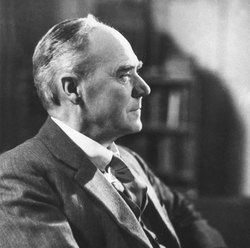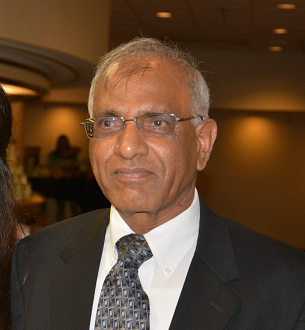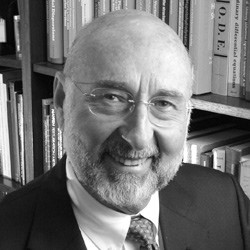
Sir Geoffrey Ingram Taylor OM FRS FRSE was a British physicist and mathematician, who made contributions to fluid dynamics and wave theory.

Sir Edmund Taylor Whittaker was a British mathematician, physicist, and historian of science. Whittaker was a leading mathematical scholar of the early 20th century who contributed widely to applied mathematics and was renowned for his research in mathematical physics and numerical analysis, including the theory of special functions, along with his contributions to astronomy, celestial mechanics, the history of physics, and digital signal processing.
The Mayor's Award for Excellence in Science and Technology is given annually to recognise important members of the science and engineering communities in New York City. Candidates must live or work in the city.
Parviz Moin is a fluid dynamicist. He is the Franklin P. and Caroline M. Johnson Professor of Mechanical Engineering at Stanford University. Moin has been listed as an ISI Highly Cited author in engineering.
John Tinsley Oden was an American engineer. He was the Associate Vice President for Research, the Cockrell Family Regents' Chair in Engineering #2, the Peter O'Donnell, Jr. Centennial Chair in Computing Systems, a Professor of Aerospace Engineering and Engineering Mechanics, a Professor of Mathematics, and a Professor of Computer Science at The University of Texas at Austin. Oden has been listed as an ISI Highly Cited Author in Engineering by the ISI Web of Knowledge, Thomson Scientific Company.

Thomas Joseph Robert Hughes is a Professor of Aerospace Engineering and Engineering Mechanics and currently holds the Computational and Applied Mathematics Chair (III) at the Oden Institute at The University of Texas at Austin. Hughes has been listed as an ISI Highly Cited Author in Engineering by the ISI Web of Knowledge, Thomson Scientific Company.
Steven Alan Orszag was an American mathematician.

Neal Russell Amundson was an American chemical engineer and applied mathematician. He was the chair of the department of chemical engineering at the University of Minnesota for over 25 years. Later, he was the Cullen Professor of Chemical & Biomolecular Engineering and Mathematics at the University of Houston. Amundson was considered one of the most prominent chemical engineering educators and researchers in the United States. The Chemical Engineering and Materials Science building at the University of Minnesota-Twin Cities bears his name.

Veniamin Grigorievich (Benjamin) Levich was a Soviet dissident who was an internationally prominent physical chemist, electrochemist, and founder of the discipline of physico-chemical hydrodynamics. He was a student of the theoretical physicist, Lev Landau. His landmark textbook Physicochemical Hydrodynamics is widely considered his most important contribution to science. The Levich equation describing a current at a rotating disk electrode is named after him. His research activities also included gas-phase collision reactions, electrochemistry, and the quantum mechanics of electron transfer.

Junuthula N. Reddy is a Distinguished Professor, Regent's Professor, and inaugural holder of the Oscar S. Wyatt Endowed Chair in Mechanical Engineering at Texas A&M University, College Station, Texas, USA.[1] He is an authoritative figure in the broad area of mechanics and one of the researchers responsible for the development of the Finite Element Method (FEM). He has made significant seminal contributions in the areas of finite element method, plate theory, solid mechanics, variational methods, mechanics of composites, functionally graded materials, fracture mechanics, plasticity, biomechanics, classical and non-Newtonian fluid mechanics, and applied functional analysis. Reddy has over 620 journal papers and 20 books and has given numerous national and international talks. He served as a member of the International Advisory Committee at ICTACEM, in 2001 and keynote addressing in 2014.[2][3]
Daniel Donald Joseph was an American mechanical engineer. He was the Regents Professor Emeritus and Russell J. Penrose Professor Emeritus of Department of Aerospace Engineering and Mechanics at the University of Minnesota. He was widely known for his research in fluid dynamics.
Leslie Gary Leal is the Warren & Katharine Schlinger Professor of Chemical Engineering at the University of California, Santa Barbara, United States. He is known for his research work in the dynamics of complex fluids.
Andrea Prosperetti is the Distinguished Professor of Mechanical Engineering at the University of Houston, the Berkhoff Professor of Applied Physics at the University of Twente in the Netherlands and an elected member of the National Academy of Engineering in 2012. He is known for his work in the field of multiphase flows including bubble dynamics and cavitation.
Chi-Wang Shu is the Theodore B. Stowell University Professor of Applied Mathematics at Brown University. He is known for his research in the fields of computational fluid dynamics, numerical solutions of conservation laws and Hamilton–Jacobi type equations. Shu has been listed as an ISI Highly Cited Author in Mathematics by the ISI Web of Knowledge.

Stephen Howard Davis was an American applied mathematician working in the fields of fluid mechanics and materials science. Davis served as McCormick School Institute Professor and Walter P. Murphy Professor of Applied Mathematics at Northwestern University. He has been listed as an ISI Highly Cited Researcher in the field of engineering. His work was acknowledged in festschrifts in 2002.

John Francis Brady is an American chemical engineer and the Chevron Professor of Chemical Engineering and Mechanical Engineering at the California Institute of Technology. He is a fluid mechanician and creator of the Stokesian dynamics method for simulating suspensions of spheres and ellipsoids in low Reynolds number flows. He is an elected fellow of the American Physical Society, a fellow of the Society of Rheology, as well as a member of the National Academy of Sciences, the National Academy of Engineering, and the American Academy of Arts and Sciences.
Howard Brenner was a professor emeritus of chemical engineering at Massachusetts Institute of Technology. His research profoundly influenced the field of fluid dynamics, and his research contribution to fundamental principles of fluid dynamics has been deeply honored. His first textbook, Low Reynolds Number Hydrodynamics, earned him a reputation lasting several decades. His profession though fundamental research is on microfluidics, complex liquids, interfacial transport process, emulsion rheology, and multiphase flows.
Bernard Judah Matkowsky was an American applied mathematician.

Eduard Feireisl is a Czech mathematician.
Morton Mace Denn is a rheologist, chemical engineer, and the Albert Einstein Professor Emeritus of Science and Engineering at the City College of New York. He is a member of the National Academy of Engineering, a Fellow of the American Academy of Arts and Sciences, and winner of a Fulbright Lectureship award, Guggenheim Fellowship, and the Bingham Medal. He previously taught at the University of Delaware and the University of California, Berkeley and was the director of the Benjamin Levich Institute for Physicochemical Hydrodynamics from 2001 to 2015. He was also a program leader at Lawrence Berkeley National Laboratory for 16 years.









